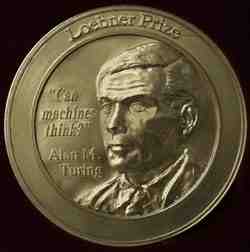| Loebner Prize Judges Could Easily Identify Chatbots |
| Written by Sue Gee | |||
| Friday, 18 May 2012 | |||
|
The 2012 Loebner Prize for the best chatbot has been awarded to Chip Vivant, created by Mohan Embar, a software consultant based in Milwaukee. There were four contestants in the final round of this competition which took place at Bletchley Park on May 15, 2012 and none of them were likely to fool the judges into mistaking them for a human as required to win the Loebner Prize Gold Medal. So instead the Bronze Medal and $5,000 was awarded to the chatbot with the most impressive conversational abilities.
Alan Turing depicted on the Loebner Prize Gold Medal
Mohan Embar, who has entered the competition every year since 2008 and was a finalist in 2009 and 2011, posted on his Chip Vivant Webiste: I’m beside myself with joy. This year’s judges were absolutely wonderful. They knew Chip was a chatbot, but were understanding, indulgent, and looked for the right stuff. The "right stuff" according to Embar is: to answer basic, commonsense questions and attempt simple deductive reasoning instead of having a massive database of canned responses in an attempt to fool users with the Eliza effect. One of the judges attempted to trip Chip up by starting with some simple arithmetic questions, something chatbots are traditionally bad at - but Chip was prepared. However, he couldn't respond when the judge then suggested: Ask me a sum. Nor could he cope with an idea supplied by one of the human participants as something that a bot would be unable to cope with: Judge: Time flies like an arrow, fruit flies like a banana. Which one is the simile? Chip: I hadn't thought of it that way. Which what? In more than one conversation Chip asks for questions to be posed explicitly saying: Please rephrase this as a proper question. (Instead of "Jim likes peaches?", use "Does Jim like peaches?") Although Chip refrains from answering the question he does gives away his bot status in this exchange: Judge: Do you know where I am? Chip: I can't deal with that syntactic variant yet. Instead of saying "Do you know what time it is?", use "What time is it?". Judge: You know that real people don't normally say things like "syntactic variant? Chip: Okay. Judge: Are you a bot? Chip: I can't reveal that. Another of the participants, Angela created by Bruce Wilcox who was awarded the second prize of $1,000 bots was claiming to be a cat rather than a human - something that is explained on "her" Facebook page, Talking Angela. Bruce Wilcox had won the 2010 and 2011 Competitions with Suzette and Rosette respectively and has open sourced his ChatScript program. Talking Angela, is available as an app for iPhone, iPad and Android. Reading the transcripts of all the conversations, which were streamed live during the event, it does seem that chatbot progress has stalled and that perhaps the format of the competition, in which exchanges take place through the now somewhat anachronistic medium of the keyboard, leave something to be desired. There's nothing here to rival the amusement value of the video posted on YouTube last year by Cornell University's Creative Machine Labs where two chatbots hold a conversation with each other, see Marvin Minsky, considered by some to be "father of artificial intelligence yet arguably responsible for halting progress in another area of AI, neural networks, for over decade, argued as long ago as 1995 that the Loebner Prize was an "obnoxious and unproductive annual publicity campaign". For it to regain some status perhaps it needs the involvement of academia or even of Google. Enthusiasts have done a reasonable job but perhaps it is time to hand the problem back to the professionals. As it happens, there is to be another Turing Test contest at Bletchley Park this year. The next event, organised by Dr Huma Shah in conjunction with Professor Kevin Warwick of the Universty of Reading is to be staged at Bletchley Park on 23rd June, the 100th anniversary of Alan Turing's birth. It has attracted some prestigious contestants most of whom are former winners of the Loebner Prize Contest (LPC). The machines competing in the event come from Rollo Carpenter, creator of Cleverbot and Jabberwacky and winner of the LPC in 2005 and 2006; Robby Garner, who won the 1998 and 199 LPC with Albert One; Robert Medeksza, whose Ultra Hal won in 2007 and Fred Roberts whose Elbot took the LPC the following year. The line up also includes Vladimir Veselov's team, creators of Eugene Gootmasn that was a runner up in 2001, 2005 and 2008. Maybe this event will be more convincing. More InformationTranscript of Loebner Prize 2012 Related ArticlesBletchley Park Hosts 2012 Loebner Prize Two chatbots chat to each other - hilarious and weird Rosette wins Loebner Prize 2011 Meet Suzette, prize winning chatbot Turing's Test, the Loebner Prize and Chatterbots Alan Turing Year - New Documentary and Lots of Events
Comments
or email your comment to: comments@i-programmer.info
To be informed about new articles on I Programmer, subscribe to the RSS feed, follow us on Google+, Twitter, Linkedin or Facebook, install the I Programmer Toolbar or sign up for our weekly newsletter.
<ASIN:0241956056> |
|||
| Last Updated ( Wednesday, 23 May 2012 ) |


